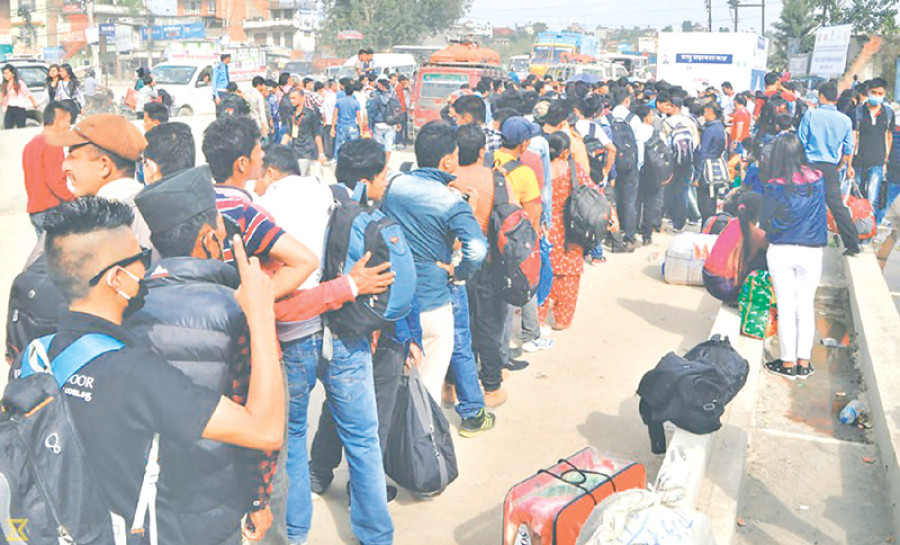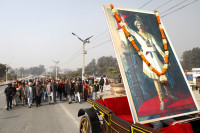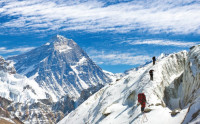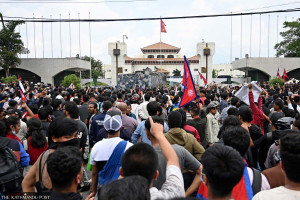Opinion
Go home again
After the media reported that a couple of million people have left Kathmandu to go home for Dashain this year, I asked the same question again—who are the permanent denizens of the Nepali Capital?
After the media reported that a couple of million people have left Kathmandu to go home for Dashain this year, I asked the same question again—who are the permanent denizens of the Nepali Capital? I turned to myself with a more daunting question: where is my home? I could answer this question without any qualms until a few decades ago—I come from a village called Sabala in Terathum district of Limbuwan. That would end the obligation to answer finer questions that would follow. But I did not have to face such questions beyond that.
After the Dashain exodus and the familiar lingo ‘going home’ resonates each year, I feel deep down how this country, like other countries of Asia, sees the movements of its citizens in droves when the festival time arrives. Blissfully, such peacetime movement is a sign of continuity and hope.
Valleys of soul-making
People going back to their native places perhaps go to their “valleys of soul-making”, to use the English poet John Keats’s phrase. Indeed, the temporary evacuation through mass movement is reminiscent of the climactic moment of peace in the history of this land. But the victims of the earthquakes of April 2015 travel for other purposes—to collect some succour promised by the state. Many returnees died when the syndicate-ordained buses and minibuses fell off the cliffs, when the over cramped buses veered off the slippery and rough roads. The story is chaotic and unacceptable.
But going back home again reminds me of a world-famous American novel entitled You Can’t Go Home Again (1940) by Thomas Wolfe. The protagonist of this novel is George Webber, who is an author. He writes a book by mentioning about the people of his hometown called Libya Hill. After reading the book, the people of that place become very angry with him, because they think he has presented a distorted picture of them.
This title became a metaphor for people who, once they left their homes, could never return for various reasons. But the Dashain exodus gives me a different sense of bonding and of the health of this land. People are still capable of linking their native places to the metropolis where they work and have businesses and where they educate their children.
Despite the terrible conditions of vehicles and roads, people say—”come what may, let’s go home”. I feel overwhelmed by a resonance of bonding and convictions during Dashain, Tihar and Chhath. Politicians and rebels halt their programmes of agitations. Unlike some countries where people use festivals as an occasion to harm other fellow citizens, people in Nepal use them to meditate on peace and continuity. Dr Govinda KC called off his hunger strike in honour of this occasion. I became very glad by his decision this time because I, like others, was very worried about his health condition. Second, he gave a chance to the dynamic young Health Minister Gagan Thapa to implement some major agreements reached with him earlier.
Yes, in Dashain!
The scale of the temporary exodus reminds us of another important phenomenon, which is the rapid urbanisation of this land and the increase in the degree of migration. We ask, did the millions of people of Kathmandu and other towns of the country go to villages that remain intact even today? Sadly, I saw some previously vibrant villages in Terathum abandoned now. I saw the selfsame houses—where people some decades ago observed Dashain with fanfare by sacrificing pigs, buffalo bulls and goats, by moving about freely in colourful dresses, and by feasting and riding on swings—completely deserted. Farmlands started turning fallow. By and by, the able-bodied people left the village to work abroad and their elders disappeared like shadows, or so it seemed to me. I felt a chill down my spine to see all that.
I remember asking about a dozen young men from Ilam working in a dairy farm in the Qatari desert, “are you going home?” The answer came as if in a chorus—”Yes, in Dashain!” The difference between what I saw in the Terathum villages and what these youths said to me in Qatar about going home intrigues me more today.
Country and city
In Nepal, the logical nuances between the countryside and the city are disappearing. This change is not so much a sign of modernisation as it is of the rise in confusion due to the shifting of the rural population to the urban areas. The following words of the great Cambridge scholar and theatre critic Raymond Williams from my favourite book The Country and the City (1973) resonate with greater meaning today. He says of the difference, “Country and city are very powerful words…they stand importantly in the experience of human communities.” He adds,”Country is both nation and part of land.” Cities are known for the “powerful hostile associations, noise, worldliness and ambition.” But in Nepal, and I guess in other countries of South Asia too, people are not only mesmerised by the “noise, worldliness and ambition” of the cities, but they also contribute to that as they leave home to go there.
But the story is not so simple. Millions of farmers are still struggling with their lands and the depleting agricultural outputs. I was alarmed when Bandana Shiva said in the annual Social Science Baha lecture that capitalist enterprises are killing the farmlands and compelling people to buy their seeds and fertilisers. I am shocked by the recent news about failed crops because of such seeds and fertilisers doled out to the innocent Nepali farmers as well.
After hearing young people working in the Qatari desert, students and government servants, office workers and entrepreneurs who have set up small businesses in the metropolis say that they are going home for Dashain and Chhath again, I felt that the people of this land working here and abroad have a tremendous tenacity for life, celebration and bonding. That itself is a great achievement. Turning around the title of Thomas Wolfe’s novel, I would love to say, “Go home again.”




 6.01°C Kathmandu
6.01°C Kathmandu










